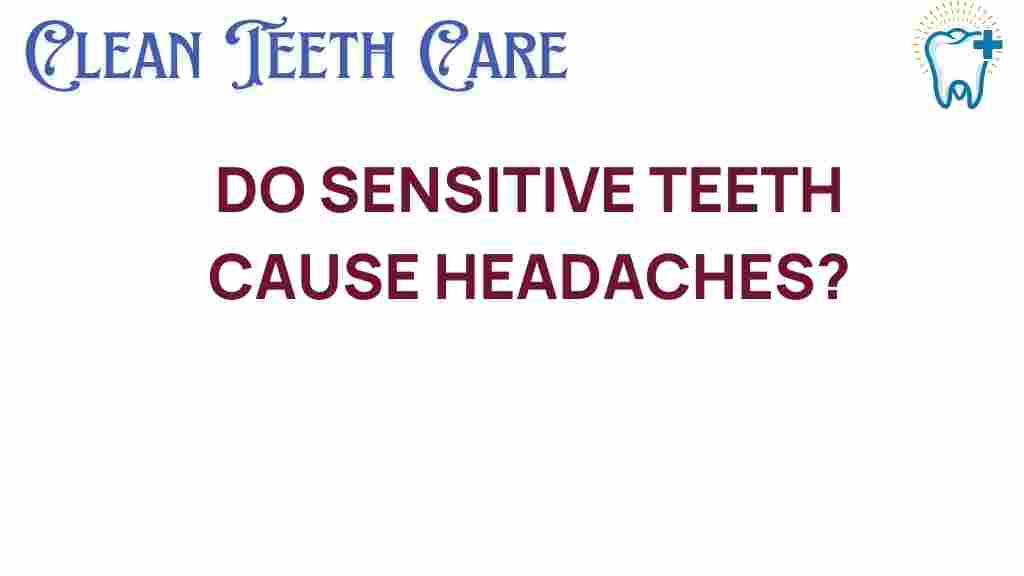The Surprising Link Between Sensitive Teeth and Chronic Headaches
When it comes to oral health, many individuals focus primarily on the aesthetic aspects of their smiles or the prevention of cavities. However, there is a significant health connection between sensitive teeth and headaches that is often overlooked. Understanding this link is crucial for effective pain management and overall dental care.
Sensitive teeth can lead to discomfort that extends beyond the mouth, potentially triggering chronic headaches or migraines. In this article, we will delve into the relationship between sensitive teeth and headaches, explore the causes of tooth sensitivity, and discuss effective strategies for pain management and migraine relief.
Understanding Sensitive Teeth
Tooth sensitivity, or dentin hypersensitivity, occurs when the underlying layer of your teeth, known as dentin, becomes exposed. This exposure can be due to several factors, including:
- Enamel erosion: Acidic foods, beverages, and poor dental hygiene can wear down tooth enamel over time.
- Gum recession: Gum disease or aggressive brushing can cause gums to recede, exposing sensitive areas of the teeth.
- Dental procedures: Certain dental treatments can temporarily increase sensitivity.
- Bruxism: Grinding or clenching your teeth can wear down enamel and increase sensitivity.
Individuals with sensitive teeth often experience sharp pain or discomfort when consuming hot, cold, sweet, or acidic foods and drinks. This dental pain can be a nuisance, but it can also lead to more significant health issues if left unaddressed.
The Connection Between Sensitive Teeth and Headaches
The health connection between sensitive teeth and headaches is rooted in the nervous system. The nerves in your teeth are closely linked to the trigeminal nerve, which is responsible for sensation in the face and can trigger headaches. Here’s how this connection works:
- Referred pain: Pain from sensitive teeth can radiate to the head, causing tension headaches or migraines.
- Muscle tension: The discomfort of tooth sensitivity can cause individuals to clench their jaws or tense their neck muscles, leading to tension headaches.
- Inflammation: Dental issues, such as gum disease, can cause inflammation that contributes to headaches.
Many people may not realize that their chronic headaches could be a result of untreated sensitive teeth. Recognizing this link is vital for effective pain management and can lead to better outcomes in both oral health and headache relief.
Step-by-Step Process for Addressing Sensitive Teeth and Headaches
Here’s a step-by-step process to help you manage sensitive teeth and the associated headaches:
Step 1: Identify Symptoms
Pay attention to your symptoms. If you frequently experience:
- Sharp pain when consuming hot or cold foods
- Discomfort that radiates to your head
- Frequent headaches or migraines
It may be time to consult with a dentist.
Step 2: Schedule a Dental Visit
Consulting a dental professional is essential for diagnosing the underlying causes of tooth sensitivity. Your dentist may suggest:
- A thorough examination of your teeth and gums
- X-rays to identify any underlying issues
- Recommendations for specific treatments
Step 3: Implement Dental Care Strategies
Once you have a diagnosis, follow your dentist’s recommendations for improving your oral health. This may include:
- Using toothpaste designed for sensitive teeth
- Practicing gentle brushing techniques
- Limiting acidic foods and beverages
- Getting fluoride treatments to strengthen enamel
Step 4: Manage Headaches
In addition to treating tooth sensitivity, it’s essential to address headaches. Consider the following:
- Over-the-counter pain relief medications, such as ibuprofen or acetaminophen
- Relaxation techniques, such as yoga or meditation
- Consulting a healthcare professional for chronic headache management
Troubleshooting: What to Do If Symptoms Persist
If you’ve followed the steps above and continue to experience sensitive teeth and headaches, consider these troubleshooting tips:
- Re-evaluate your dental hygiene: Ensure you are brushing and flossing correctly.
- Assess your diet: Look for hidden acidic foods and beverages that may be affecting your teeth.
- Consider stress management: Stress can exacerbate headaches and may lead to tooth clenching.
- Seek a second opinion: If symptoms persist, another dental consultation may offer fresh insights.
Conclusion: Prioritize Your Oral Health for Overall Well-Being
The surprising link between sensitive teeth and chronic headaches highlights the importance of comprehensive dental care. By addressing tooth sensitivity, you can not only alleviate dental pain but also reduce the frequency and intensity of headaches. Prioritizing your oral health is a crucial step towards enhancing your overall well-being.
If you’re experiencing sensitive teeth or persistent headaches, don’t hesitate to take action. Consult with your dentist and explore effective pain management strategies that can lead to better health outcomes.
For more information on dental care and how it impacts your overall health, check out this external resource.
Remember, your smile is a reflection of your health. Take the necessary steps today to ensure that both your teeth and your head feel their best!
This article is in the category Conditions and created by CleanTeethCare Team
